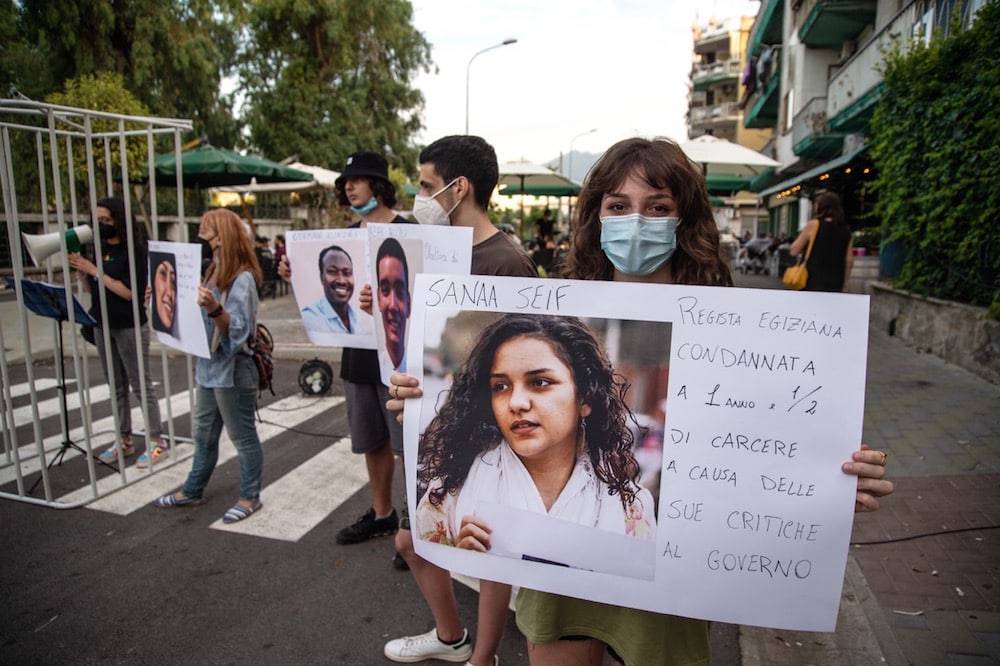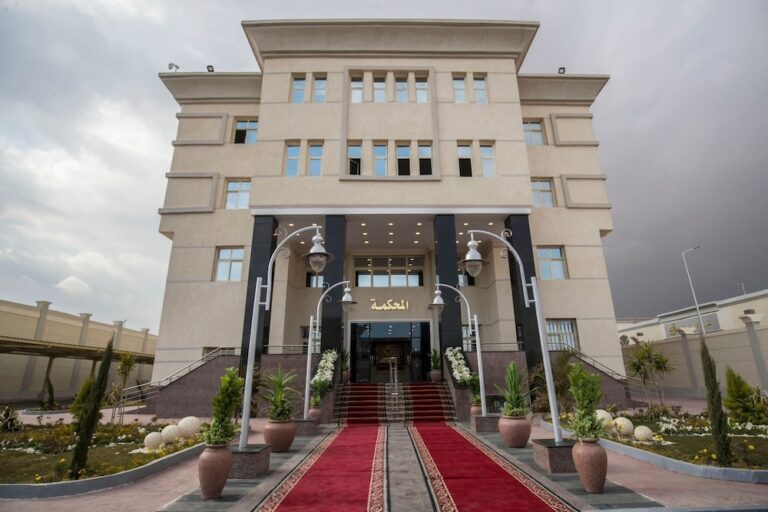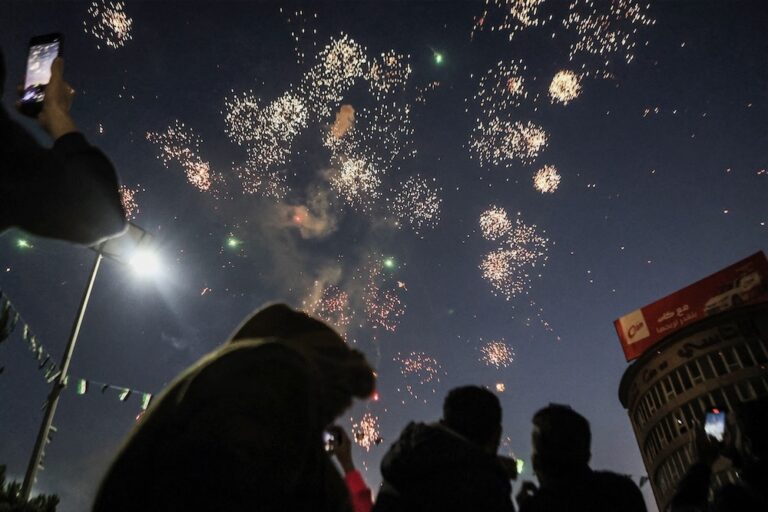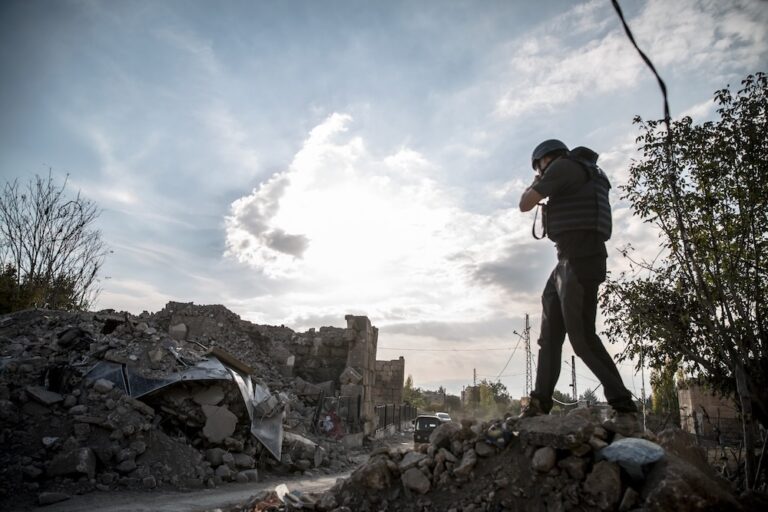December 2021 in Middle East and North Africa: A free expression roundup produced by IFEX's Regional Editor Naseem Tarawnah, based on IFEX member reports and news from the region.
Activists sentenced in Egypt’s unjust emergency courts. Digital surveillance continues to target vocal critics at home and abroad. And what accounts for the region’s unexpected decline in attacks on journalists in 2021?
Egypt: Emergency courts host farcical trials
Last month, Egypt’s Misdemeanours Emergency State Security Court sentenced Alaa Abd El Fattah and Mohamed ‘Oxygen’ Ibrahim to five-year prison terms, while human rights lawyer Mohamed Al-Baqer received a four-year sentence. Charged with spreading false news, the unjust verdict against the three “confirms the Egyptian government’s continuation of its hostile policies towards human rights, despite its declaration of a human rights strategy that claims the presence of an independent judiciary and respect for human rights in the country”, said rights groups in a joint statement published in December.
In the statement, ten rights groups condemned the continued use of exceptional courts and bogus terrorism charges against the state’s peaceful opponents and critics – a tactic that they say exposes Egypt’s human rights strategy as a “farce” and “only confirms the Sisi government’s hostile approach towards human rights, especially the right to free expression, despite its claims to the contrary when addressing the international community.”
While it remains unclear whether the two years already served in pretrial detention by the activists since their arrests in September 2019 will be counted toward their sentences, the verdict cannot be appealed as it was issued by an emergency court and awaits final ratification by President Sisi.
“Only the president’s refusal to ratify the verdict would indicate any semblance of genuine intent to respect human rights, an intent that has thus far not been evidenced in policy or practice,” said the rights groups.
The case was only one of several being fast-tracked through emergency courts in the closing weeks of 2021, in what Human Rights Watch (HRW) called a “wave of unjust ‘emergency’ trials”. According to that organization, at least 48 unjustly detained rights defenders, activists, and opposition politicians already languishing in pre-trial detention were referred to emergency courts for trial, just before the president lifted the state of emergency on 25 October 2021.
“Trials of human rights defenders and peaceful critics in these special courts for peaceful dissent constitute a grave injustice because the President’s broad authority over these courts undermines their independence and impartiality,” says Joe Stork, deputy MENA director at HRW. “The government’s rush to use emergency courts before declaring the end to the state of emergency, after holding people illegally for years in pretrial detention, confirms that fierce repression of peaceful critics remains the order of the day in Egypt.”
Meanwhile, Alaa’s sister, activist Sanaa Seif was released last month after serving 18 months in detention on charges of “spreading false news,” “misusing social media,” and insulting a police officer.
“Sanaa was imprisoned on spurious charges related purely to her peaceful criticism of the government. She should never have been detained in the first place,” said Julie Trebault at PEN America.
“We celebrate Sanaa’s freedom and we salute her courage and her tireless dedication to advocating for human rights and artistic freedom. Sanaa’s treatment is emblematic of the Egyptian government’s efforts to clamp down on any and all free expression and we call on the government to release those artists and activists who remain arbitrarily behind bars, including her brother Alaa,” PEN America added.
In another welcome move, human rights activist and researcher Patrick Zaki was provisionally released after serving 22 months in detention since his February 2020 arrest. However, the 28-year old academic still faces charges, including “calling for protests without permission”, “spreading false news” and “inciting violence and terrorism”, with his trial set to resume on 1 February 2022.
Under surveillance: The phones are still listening
The phone of prominent Egyptian opposition leader, Ayman Nour, was hacked in two separate attacks, according to a recent Citizen Lab report. Researchers identified Pegasus spyware by Israeli NSO Group and Predator spyware developed by the Europe-based firm Cytrox being used in the attacks, which also targeted an Egyptian exiled journalist who hosts a popular news program. Considered one of President Sisi’s most vocal critics, the Istanbul-based Nour pointed to Egypt, Saudi Arabia and the United Arab Emirates as likely sponsors of the attacks.
Tunisian human rights expert Kamel Jendoubi was also targeted with Pegasus spyware last year. According to an Amnesty International and Citizen Lab report, Jendoubi, who chaired a UN panel investigating war crimes in Yemen, was targeted weeks before the release of a damning report that pointed to the Saudi-led coalition having committed “serious violations of international humanitarian law” in Yemen that could lead to “criminal responsibility for war crimes”.
Meanwhile, IFEX member the Electronic Frontier Foundation (EFF) filed a lawsuit on behalf of prominent Saudi human rights activist Loujain AlHathloul against spying software developer DarkMatter Group and three of its former executives for illegally hacking her phone in 2017, prior to her arrest.
“No government or individual should tolerate the misuse of spy malware to deter human rights or endanger the voice of the human conscience,” said AlHathloul in a statement. “This is why I have chosen to stand up for our collective right to remain safe online and limit government-backed cyber abuses of power. I continue to realize my privilege to possibly act upon my beliefs.”
The Abu-Dhabi based cybersecurity firm, which operated an illegal spying program run by former US intelligence operatives called Project Raven, reportedly hacked into AlHathloul’s iPhone, gaining access to her communications and tracking her movements.
“Companies that peddle their surveillance software and services to oppressive governments must be held accountable for the resulting human rights abuses,” said EFF Civil Liberties Director David Greene. “The harm to Loujain AlHathloul can never be undone. But this lawsuit is a step toward accountability.”
Lastly, a new report by IFEX member the Gulf Centre for Human Rights (GCHR) examined how authorities in the Gulf region and neighbouring states have used the COVID-19 pandemic to justify heightened digital surveillance. Focusing on the use of COVID-19 contact tracing apps and the laws and policies governing data rights in Bahrain, Iran, Jordan, Kuwait, Oman, Qatar, Saudi Arabia, and the United Arab Emirates, the report also highlighted how citizens can better protect their right to privacy, safety, and freedom of expression.
In Brief
Saudi Arabia: A Saudi appeals court upheld a 15-year jail sentence for a Yemeni journalist on charges of promoting “apostasy, unbelief and atheism”. Ali Abu Luhum was sentenced last October based on postings from two anonymous Twitter accounts with phone numbers connected to him. Abu Luhum was initially interrogated and signed a coerced confession that would have seen him receive the death penalty under the kingdom’s apostasy law. The 15-year sentence marked one of last year’s longest sentences handed down by a court, according to Reporters Without Borders (RSF).
“His arrest and conviction show that use of the Internet and social media by journalists and bloggers as a space for debate and for exchanging information is still subject to draconian surveillance in Saudi Arabia,” said Sabrina Bennoui, the head of RSF’s Middle East desk.
Bahrain: While authorities released 105 prisoners to mark Bahrain’s National Day on 16 December, the country’s leading dissident voices remain firmly behind bars. Ahead of the day, rights groups campaigned for the inclusion in the pardon of prominent opposition leaders, including Hassan Mushaima, Abdulwahab Hussain, and human rights defenders Abdulhadi al-Khawaja, and Abdel-Jalil al-Singace, all of whom are serving life sentences.
Al-Singace has been on a hunger strike since 8 July 2021, while Mushaima’s son, Ali, went on a 23-day hunger strike outside the Bahraini embassy in London last month to bring attention to his 74-year old father’s plight.
“I cannot express to you how hard it has been, but my pain is nothing to the suffering that my father and hundreds of other political prisoners in Bahrain have gone through,” said Ali upon ending his strike.
Palestine: Travel bans prevent dozens of Palestinian journalists from leaving the West Bank and Gaza Strip, violating their rights to freedom of movement and free expression, said RSF and the Euro-Mediterranean Human Rights Monitor last month. The rights groups called on Israel to end its arbitrary travel bans on Palestinian journalists, including Majdoleen Hassona, who has been banned from leaving the West Bank to go to her residence in Istanbul for over two years. According to RSF, at least 21 Palestinian journalists continue to face similar travel bans.
Also Noteworthy
IFEX members Privacy International and the Arab Center for the Advancement of Social Media (7amleh) published an insightful online guide to “Digital Security and Privacy at Peaceful Protests”. The guide offers a resource and reference on surveillance technologies that authorities use for suppression during peaceful protests by Palestinians in the occupied territories, including phone hacking, location tracking, social media monitoring, facial recognition technologies, and drones.
Research by the Committee to Protect Journalists (CPJ) found that attacks on the press in the MENA region declined last year. While the region has been home to 43% of journalists around the world killed in the last decade, CPJ recorded only one journalist killed in 2021 as a result of their work – Lebanese journalist Lokman Slim. The rights group pointed to several factors explaining the trend, such as governments in the region increasingly employing methods such as censorship, surveillance, and criminalization of journalism and continued arrests to silence outspoken reporters.



